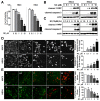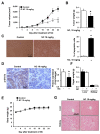Nitidine chloride acts as an apoptosis inducer in human oral cancer cells and a nude mouse xenograft model via inhibition of STAT3
- PMID: 29207645
- PMCID: PMC5710925
- DOI: 10.18632/oncotarget.20444
Nitidine chloride acts as an apoptosis inducer in human oral cancer cells and a nude mouse xenograft model via inhibition of STAT3
Abstract
Nitidine chloride (NC) is a natural alkaloid compound derived from the plant Zanthoxylum nitidum and is known for its therapeutic anticancer potential. In this study, we investigated the effects of NC on growth and signaling pathways in human oral cancer cell lines and a tumor xenograft model. The apoptotic effects and related molecular targets of NC on human oral cancer were investigated using trypan blue exclusion assay, DAPI staining, Live/Dead assay, Western blotting, Immunohistochemistry/Immunofluorescence and a nude mouse tumor xenograft. NC decreased cell viability in both HSC3 and HSC4 cell lines; further analysis demonstrated that cell viability was reduced via apoptosis. STAT3 was hyper-phosphorylated in human oral squamous cell carcinoma (OSCC) compared with normal oral mucosa (NOM) and dephosphorylation of STAT3 by the potent STAT3 inhibitor, cryptotanshinone or NC decreased cell viability and induced apoptosis. NC also suppressed cell viability and induced apoptosis accompanied by dephosphorylating STAT3 in four other oral cancer cell lines. In a tumor xenograft model bearing HSC3 cell tumors, NC suppressed tumor growth and induced apoptosis by regulating STAT3 signaling without liver or kidney toxicity. Our findings suggest that NC is a promising chemotherapeutic candidate against human oral cancer.
Keywords: STAT3; apoptosis; nitidine chloride; oral cancer.
Conflict of interest statement
CONFLICTS OF INTEREST No potential conflicts of interest are declared.
Figures





References
-
- Fang Z, Tang Y, Jiao W, Xing Z, Guo Z, Wang W, Shi B, Xu Z, Liu Z. Nitidine chloride inhibits renal cancer cell metastasis via suppressing AKT signaling pathway. Food Chem Toxicol. 2013;60:246–251. - PubMed
-
- Wang Z, Jiang W, Zhang Z, Qian M, Du B. Nitidine chloride inhibits LPS-induced inflammatory cytokines production via MAPK and NF-kappaB pathway in RAW 264.7 cells. J Ethnopharmacol. 2012;144:145–150. - PubMed
-
- Chen J, Wang J, Lin L, He L, Wu Y, Zhang L, Yi Z, Chen Y, Pang X, Liu M. Inhibition of STAT3 signaling pathway by nitidine chloride suppressed the angiogenesis and growth of human gastric cancer. Mol Cancer Ther. 2012;11:277–287. - PubMed
-
- Kang M, Ou H, Wang R, Liu W, Tang A. The effect of nitidine chloride on the proliferation and apoptosis of nasopharyngeal carcinoma cells. J BUON. 2014;19:130–136. - PubMed
-
- Sun M, Zhang N, Wang X, Cai C, Cun J, Li Y, Lv S, Yang Q. Nitidine chloride induces apoptosis, cell cycle arrest, and synergistic cytotoxicity with doxorubicin in breast cancer cells. Tumour Biol. 2014;35:10201–10212. - PubMed
LinkOut - more resources
Full Text Sources
Other Literature Sources
Miscellaneous

